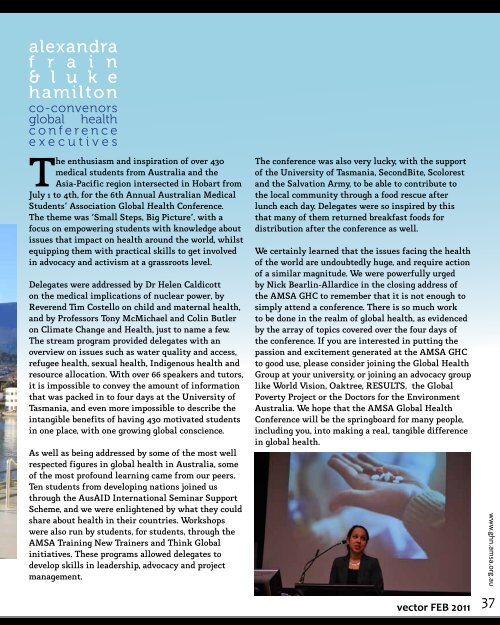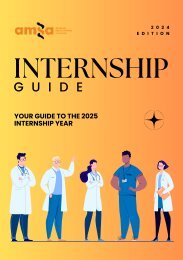Create successful ePaper yourself
Turn your PDF publications into a flip-book with our unique Google optimized e-Paper software.
alexandra<br />
f r a i n<br />
& l u k e<br />
hamilton<br />
co-convenors<br />
global health<br />
conference<br />
executives<br />
The enthusiasm and inspiration of over 430<br />
medical students from Australia and the<br />
Asia-Pacific region intersected in Hobart from<br />
July 1 to 4th, for the 6th Annual Australian Medical<br />
Students’ Association Global Health Conference.<br />
The theme was ‘Small Steps, Big Picture’, with a<br />
focus on empowering students with knowledge about<br />
issues that impact on health around the world, whilst<br />
equipping them with practical skills to get involved<br />
in advocacy and activism at a grassroots level.<br />
Delegates were addressed by Dr Helen Caldicott<br />
on the medical implications of nuclear power, by<br />
Reverend Tim Costello on child and maternal health,<br />
and by Professors Tony McMichael and Colin Butler<br />
on Climate Change and Health, just to name a few.<br />
The stream program provided delegates with an<br />
overview on issues such as water quality and access,<br />
refugee health, sexual health, Indigenous health and<br />
resource allocation. With over 66 speakers and tutors,<br />
it is impossible to convey the amount of information<br />
that was packed in to four days at the University of<br />
Tasmania, and even more impossible to describe the<br />
intangible benefits of having 430 motivated students<br />
in one place, with one growing global conscience.<br />
As well as being addressed by some of the most well<br />
respected figures in global health in Australia, some<br />
of the most profound learning came from our peers.<br />
Ten students from developing nations joined us<br />
through the AusAID International Seminar Support<br />
Scheme, and we were enlightened by what they could<br />
share about health in their countries. Workshops<br />
were also run by students, for students, through the<br />
AMSA Training New Trainers and Think Global<br />
initiatives. These programs allowed delegates to<br />
develop skills in leadership, advocacy and project<br />
management.<br />
The conference was also very lucky, with the support<br />
of the University of Tasmania, SecondBite, Scolorest<br />
and the Salvation Army, to be able to contribute to<br />
the local community through a food rescue after<br />
lunch each day. Delegates were so inspired by this<br />
that many of them returned breakfast foods for<br />
distribution after the conference as well.<br />
We certainly learned that the issues facing the health<br />
of the world are undoubtedly huge, and require action<br />
of a similar magnitude. We were powerfully urged<br />
by Nick Bearlin-Allardice in the closing address of<br />
the AMSA GHC to remember that it is not enough to<br />
simply attend a conference. There is so much work<br />
to be done in the realm of global health, as evidenced<br />
by the array of topics covered over the four days of<br />
the conference. If you are interested in putting the<br />
passion and excitement generated at the AMSA GHC<br />
to good use, please consider joining the Global Health<br />
Group at your university, or joining an advocacy group<br />
like World Vision, Oaktree, RESULTS, the Global<br />
Poverty Project or the Doctors for the Environment<br />
Australia. We hope that the AMSA Global Health<br />
Conference will be the springboard for many people,<br />
including you, into making a real, tangible difference<br />
in global health.<br />
www.ghn.amsa.org.au<br />
vector FEB <strong>2011</strong><br />
37

















